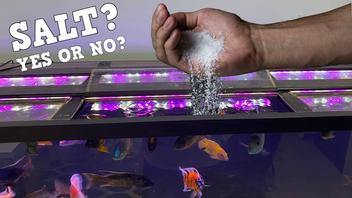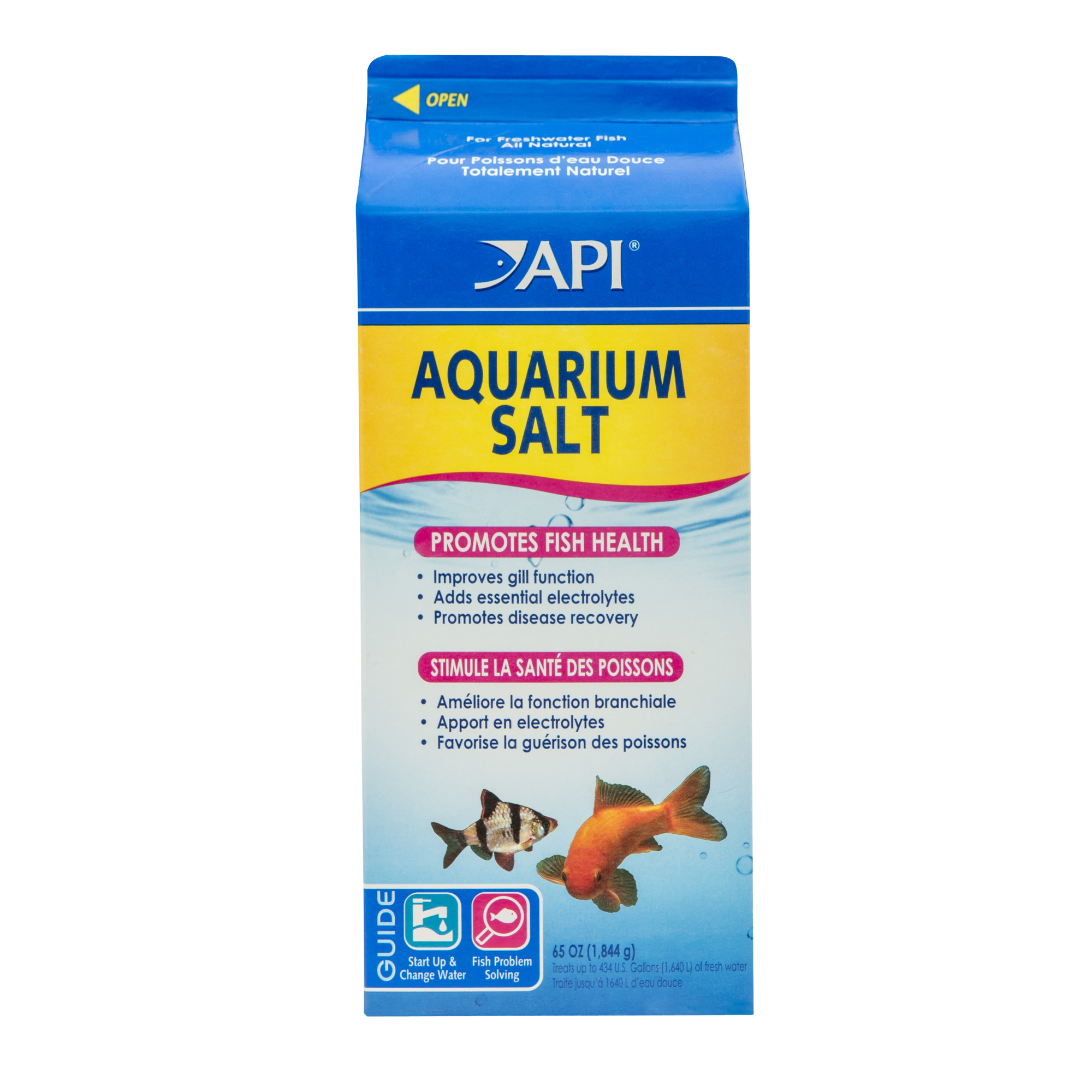Originally posted on May 13, 2023 @ 6:00 am
Last Updated on 6 months by admin
Aquariums are a source of beauty and tranquility that can add a touch of serenity to any room. As an aquarium owner, you are responsible for the well-being of your aquatic pets, and maintaining a healthy environment is crucial. One common question that arises in the aquarium community is whether aquarium salt can raise pH levels. In this article, we’ll explore the relationship between aquarium salt and pH levels, and provide you with the information you need to make informed decisions about your aquarium’s health.
The topic of aquarium salt and its impact on pH levels can be confusing for many aquarium enthusiasts. While some claim that aquarium salt can raise pH, others argue that it has no effect. As a result, it’s important to understand the science behind this topic to ensure that your aquarium stays healthy and balanced. So, let’s dive in and explore the relationship between aquarium salt and pH in more detail.
Adding aquarium salt to your aquarium water does not raise pH levels. In fact, it has a negligible effect on pH. Aquarium salt is used to treat and prevent certain fish diseases, and it can also help to reduce stress in fish. If you need to adjust the pH level in your aquarium, you will need to use a different product specifically designed for that purpose.

Does Aquarium Salt Raise pH?
Aquarium salt is a common additive that many aquarium owners use to help maintain the health and well-being of their fish. However, there is often confusion about whether or not aquarium salt can raise pH levels in the tank. In this article, we will explore the relationship between aquarium salt and pH and provide some insights into how you can use aquarium salt to improve the health of your fish.
What is Aquarium Salt?
Aquarium salt is a specially formulated blend of salts that is designed to mimic the natural environment of fish. It is made up of a combination of sodium chloride, magnesium sulfate, and other trace elements that are important for the health of fish. Aquarium salt can be used to treat a variety of common ailments in fish, including bacterial infections, fungal infections, and parasites. It can also be used to help reduce stress and improve overall health.
When added to the aquarium, aquarium salt dissolves in the water and creates a saline environment that is similar to the natural habitat of many fish species. This can help to reduce stress and improve the overall health of fish. However, some aquarium owners are concerned that adding aquarium salt to their tank may raise the pH levels, which can be harmful to their fish.
Does Aquarium Salt Raise pH?
The short answer is no, aquarium salt does not raise pH levels in the tank. This is because aquarium salt is a neutral substance that does not affect the pH balance of the water. However, it is important to note that if the pH levels in your tank are already high, adding aquarium salt can exacerbate the problem. This is because high pH levels can cause the aquarium salt to break down into its component parts, which can in turn raise the pH levels even further.
If you are concerned about the pH levels in your tank, it is important to monitor them regularly and take steps to maintain a healthy balance. This can be achieved by using a pH testing kit and adjusting the water chemistry as necessary. Adding aquarium salt can be a valuable tool in maintaining the health of your fish, but it is important to use it in moderation and with care.
The Benefits of Using Aquarium Salt
There are many benefits to using aquarium salt in your tank. One of the most important is that it can help to reduce stress in fish. This is because the saline environment created by the aquarium salt is similar to the natural habitat of many fish species. This can help to reduce stress and improve overall health.
In addition to reducing stress, aquarium salt can also be used to treat a variety of common ailments in fish. It can help to prevent and treat bacterial infections, fungal infections, and parasites. It can also be used as a general tonic to improve overall health and reduce the risk of disease.
Another benefit of using aquarium salt is that it is relatively inexpensive and easy to use. It can be purchased at most pet stores and online retailers, and can be added to the tank with minimal effort. This makes it a convenient and cost-effective way to maintain the health of your fish.
Aquarium Salt vs. Table Salt
It is important to note that aquarium salt is not the same as table salt. Table salt is not suitable for use in aquariums because it contains additives that can be harmful to fish. It is also not formulated to provide the trace elements that are important for fish health.
Aquarium salt, on the other hand, is specially formulated to provide the optimal balance of salts and trace elements for fish. It is free from harmful additives and is safe for use in aquariums.
Using Aquarium Salt Safely and Effectively
While aquarium salt can be a valuable tool in maintaining the health of your fish, it is important to use it safely and effectively. Here are some tips to help you use aquarium salt in your tank:
– Always follow the instructions on the packaging when adding aquarium salt to your tank.
– Use aquarium salt in moderation. Overuse can lead to high salt levels, which can be harmful to fish.
– Monitor the pH levels in your tank regularly to ensure that they remain within a healthy range.
– Never use table salt or any other type of salt that is not specifically formulated for aquarium use.
– If in doubt, consult a veterinarian or aquarium expert for advice on using aquarium salt safely and effectively.
Conclusion
In conclusion, aquarium salt is a valuable tool that can help to maintain the health and well-being of your fish. While it does not raise pH levels in the tank, it is important to use it safely and effectively to avoid any potential harm to your fish. With proper use and care, aquarium salt can be a valuable addition to your aquarium maintenance routine.
Freequently Asked Questions
Does Aquarium Salt Raise Ph?
Many aquarium owners wonder if adding aquarium salt to their tank will raise the pH level. The answer is not straightforward since it depends on various factors. Aquarium salt typically has a neutral pH level, meaning it won’t increase or decrease the pH of your tank on its own. However, if you’re using salt as a treatment for a specific disease or to promote fish health, the added stress on your fish may cause a pH fluctuation.
If you’re concerned about your pH levels, it’s best to monitor them regularly and make adjustments as needed. Adding salt to your tank can have many benefits, but it’s important to use it correctly and in moderation to avoid any negative effects on your fish and the overall health of your aquarium.
How Much Aquarium Salt Should I Add?
The amount of aquarium salt you should add to your tank depends on the reason for adding it. For general health and prevention, a good rule of thumb is to add one tablespoon of salt per five gallons of water. If you’re using salt as a treatment for a specific disease, it’s best to follow the instructions provided by a veterinarian or experienced aquarium hobbyist.
It’s important to note that adding too much salt can be harmful to your fish, so it’s crucial to measure carefully and avoid overdosing. Additionally, some fish species are more sensitive to salt than others, so it’s essential to research your fish’s specific needs before adding any salt to your tank.
Does Aquarium Salt Kill Beneficial Bacteria?
Aquarium salt can have an impact on the beneficial bacteria in your tank, but whether or not it kills them depends on the concentration of salt and the type of bacteria. Saltwater bacteria, like those found in marine aquariums, are generally more tolerant of salt than freshwater bacteria.
However, in a freshwater tank, adding too much salt can harm the beneficial bacteria that help keep your tank’s water clean and healthy. It’s essential to maintain a proper balance of salt and bacteria in your tank, and if you’re using salt as a treatment, it’s best to remove any activated carbon or other chemical filtration media to avoid removing the medication from the water.
Can Aquarium Salt Be Used with Live Plants?
Aquarium salt can be used with live plants, but it’s essential to be careful about the concentration and frequency of use. Most freshwater plants can tolerate low levels of salt, but high concentrations can damage or kill them.
If you’re using salt as a preventive measure or for general health, it’s best to limit the amount to one tablespoon per five gallons of water and avoid direct contact with the plants. If you’re using salt as a treatment, it’s best to remove the plants from the tank or use a separate quarantine tank to avoid any negative effects on the plants.
How Do I Remove Aquarium Salt from My Tank?
If you’ve added too much aquarium salt or need to remove it for any reason, there are several ways to do so. One method is to perform a partial water change, replacing a portion of the tank’s water with fresh, salt-free water. This can gradually dilute the salt concentration in your tank.
Another option is to use a chemical filtration media designed to remove salt from the water. However, it’s essential to follow the instructions carefully and avoid removing too much salt too quickly, as this can stress your fish and harm the overall health of your aquarium.

Do You Need Salt In Your Aquarium? Pros and Cons
In conclusion, the answer to whether aquarium salt raises pH is not a straightforward one. While some sources claim that it can increase pH levels, others suggest that it has little to no effect. Ultimately, the impact of aquarium salt on pH will depend on a variety of factors, including the type and amount of salt used, the water chemistry of the tank, and the species of fish and plants present.
It is important to keep in mind that maintaining a stable pH level in your aquarium is crucial for the health and wellbeing of your aquatic pets. Regular water testing and careful monitoring of pH levels can help you determine whether the use of aquarium salt is appropriate for your tank. As always, it is recommended to consult with a professional or experienced aquarist before making any changes to your aquarium setup.
Overall, while the use of aquarium salt can offer numerous benefits for fish and plants, it is important to approach its use with caution and careful consideration. By staying informed and taking the necessary precautions, you can help ensure that your aquarium remains a safe and healthy environment for all its inhabitants.
